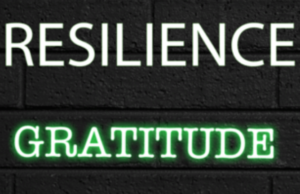
“Gratitude is not only the greatest virtue,
but the parent of all virtues.”
– Cicero
How was your Thanksgiving? The travel, social distancing and other constraints we faced this holiday certainly compromised our ability to gather with family and friends to celebrate. Likewise, many traditional activities such as football games, parades, and Black Friday shopping sprees went by the wayside. Regardless, I’m still hoping that you were able to enjoy it, and that you took a moment to think about all for which you should be grateful. After all, isn’t that what Thanksgiving is supposed to be about; being thankful and expressing gratitude for the abundance in our life? Here’s a thought, why not let that Thanksgiving spirit linger for a while? We are going to need it!
The past few weeks were difficult and the next four will be even more challenging. Not only will we be confronting growing Pandemic numbers, but similar to what we experienced at Thanksgiving, we will be repeatedly warned to cancel holiday gatherings and remain at home. But there is good news! Vaccines developed by Pfizer, AstraZeneca and Moderna may soon be approved and prepared for distribution. Dr Anthony Fauci, the U.S. Infectious Disease expert said, “The vaccine is really the light at the end of the tunnel” That is certainly good news and gives us hope, but the reality is we won’t be seeing wide vaccine availability until later in 2021. So how can we keep that hope alive? By expressing gratitude!
The stresses associated with our health, our jobs and finances have the potential to create a vicious downward spiral that impacts our physical and mental health, hurting our performance at work, and straining our relationships. There is no vaccine for this, but we each have a natural immunity agent that can help us through these tough times; it’s called resilience and it can be built and strengthened through the expression of gratitude. Put another way, if resilience is the engine that enables us to bounce back in the face of adversity, gratitude is the fuel that feeds it.
Numerous research projects have shown that practicing gratitude impacts key brain circuits that contribute to mood, motivation, and resilience. These same studies have demonstrated that practicing gratitude can make you feel happier, lower your stress, and even improve your sleep. In essence, gratitude becomes the means by which we strengthen our own resilience and that of others, and the good news is it’s something you can begin to do today.
Feeling grateful is a lot easier than demonstrating it, but it is often what we do for others that has its most lasting impact on us.
-
Reflect and Journal – Dedicate a period of time at the end of each day to reflect and identify three(3) things that happened for which you are grateful. These are your “grateful moments”. They brought positivity into your life, and they are worthy of note.
-
Demonstrate Gratitude – When appropriate, connect people to the things for which you are grateful. Remember, “Thank you” can be an incredibly powerful pair of words, especially if the person you’re thanking really needs to hear them, or isn’t expecting them. Three ways to do this are:
-
Start your day by writing a short thank-you note to someone who did you a service, provided a “grateful moment” or simply gave you cause to smile. Mail or hand deliver it.
-
Skip the email or text and verbalize your thanks and gratitude to the colleague, friend, service person or whomever’s actions gave you reason to be grateful.
-
Use your phone to reach out to an old friend or someone who inspired you. Rekindle the relationship and let them know they played an important role in shaping the person you have become.
-
-
Subtract a Blessing – Too often, we take things for granted. An effective way of stimulating gratitude is to reflect on what our life would be like without certain blessings. When we imagine our life without them we develop a greater appreciation for what we have versus what we desire.
-
Serve Others – Think about opportunities to give back to your neighborhood, community, or place of worship. Nothing demonstrates gratitude more than volunteering your time and talent for the greater good.
In 1621, the Plymouth colonists shared an autumn harvest feast with the Wampanoag Native Americans to express their gratitude for helping them survive their first year on the new continent. Next year will mark the 400th commemoration of Thanksgiving. I’m hoping that we will have much to be grateful for, including the availability of a vaccine that will end this Pandemic. Until then, let’s have the gratitude that we experienced this past holiday remain and help us build the resilience we will need to meet the challenges facing us. Gratitude; let it linger!
Embrace The Challenge
